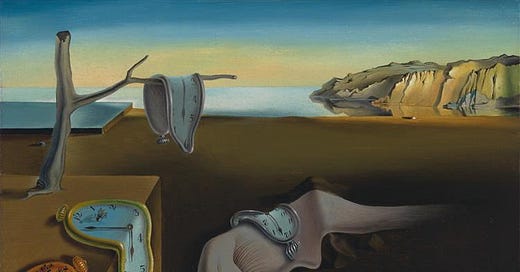Timing is everything: Circadian science deep dive part II
Make workouts, work, medicine, marathons, and more work better with the new science of timing.
Post summary
On Monday, we explored circadian rhythms and how they influence health. That post was based on a conversation with Lynne Peeples, author of The Inner Clock.
Today I’m following up on some important topics we didn’t get to in that post.
You’ll learn:
My perfect day and how I’ve used and diverged from the advice of circadian science. This has lessons for self-reliance.
How to use circadian science for better fitness. For example, to run a faster marathon.
How to use circadian science to improve your performance at work.
How to use circadian science to get a better outcome if you had a medical procedure or treatment, or had to take a medication.
Housekeeping
Full access to this post and its audio version is for Members of Two Percent.
Become a Member to get full access to high-impact posts and podcasts that improve your life and save you time and money.
Thanks to our partners:
Maui Nui Venison: Provider of the world’s healthiest meat (the research, linked here, is wild). My go-to: Organ blend 90-10 and pepper venison jerky sticks.
Momentous Nutrition: The company that made me feel good about supplements again. My picks: Essential Plant Protein + Multivitamin.
GORUCK: Maker of the best rucking gear (not stuff). Check out the Rucker 4.0 for rucking and the GR1 or GR2 for travel.
Use discount code EASTER for all brands.
Audio/podcast version
The post
On Monday, we featured a conversation about circadian rhythms with Lynne Peeples, author of The Inner Clock.
ICYMI: Circadian rhythms are the 24-hour cycles humans evolved to function under. But modern life has thrown them off. We covered all sorts of useful ways to leverage the sun and darkness to improve your health, metabolism, sleep, and more.
But when Lynne and I spoke, we covered many other important topics in circadian science.
Today’s post is a scattershot of useful information about our circadian rhythms and how you can leverage them to live and perform better.
Let’s roll …
Use circadian science for better athletic performance
Section summary: Most people hit their athletic peak later in the day, so you may want to schedule your workouts in the afternoon. On the other hand, if you’re training for a competition that begins early, like a marathon, exercise early in the morning to prime your body.
The time of day you exercise may determine whether the miles go by smoother and faster and the weights rise with less effort.
Lynne told me, “Our peak performance times throughout the day also follow a rhythm. So the time of day you’re strongest and fastest on average is the late afternoon or early evening. It depends on your personal clocks. But let’s say you had a sports team—the team’s collective peak performance would likely be in the late afternoon or early evening1.”
We see this in professional sports data. Teams traveling two time zones or more are at a statistically significant disadvantage. For example:
Time-zone-traveling NBA players make two percent fewer shots than in their home time zones.
Travel, time zones crossed, and recovery are up to 78 percent predictive of who will win an NBA game, regardless of the teams’ skill.
MLB teams with a three-hour time-zone advantage win 62 percent of games compared to 52 percent if their time-zone advantage is less than three hours.
How you can use this:
Assuming you’re not forced to exercise at a certain time of day (e.g., morning before the family gets up), exercise at the time your body feels most primed.
This will likely be late afternoon. Doing this will allow you to push your fitness further, accumulating more gains over the long run.
Caveat: If you sign up for a marathon or other competition that starts early in the morning, train during the time of your competition.
Lynne said, “If you train at the same time every day, you’re telling your body to be primed to exercise during that time. You're kind of communicating to your body, those body clocks too, about time of day. If you train at the same time, your body's going to be more ready.”
If your schedule doesn’t allow regular morning runs, squeeze in a few in the weeks before race day.
If anything, you’ll know what it feels like to run early—and that feeling won’t be a new stress that hinders you on race day.
Use circadian science for more effective medical treatments
Section summary: How you time everything from cancer treatment to surgery to when you take medication can lead to significantly better health outcomes.
Lynne seemed most fascinated by the emerging field of chronotherapy, which she described as “scheduling treatments so that they provide the most help and do the least harm.”
Cancer
Research suggests 42 percent of men and 38 percent of women get cancer at some point in their life. When you treat the cancer influences your odds of survival.




